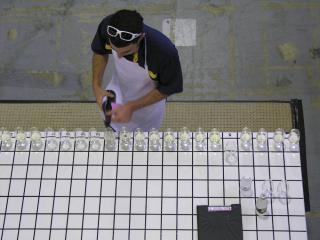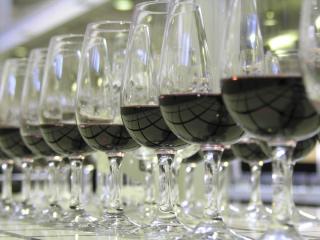How Many Wines... The Answer is Blowing in the Wind
POSTED ON 25/01/2010I have just come from a tasting of 64 champagnes put on by Fine & Rare Wines. The tasting was blind and the results of the wines tasted by Fine & Rare, myself and Her Majesty Jancis Robinson MW (unpaid I should make clear) will soon form part of an offer to be made by Fine & Rare Wines based on growers’ champagnes. Good for them. We’re so subservient to the Grandes Marques in this country that we rarely take the time out of our comfort zone to look for really interesting and characterful champagnes made by growers.
 How many wines?
How many wines?
What small growers lack in volumes they make up for in character. It’s a shame then that with the exception of a few companies like Vine Trail, our importers don’t offer more growers’ champagnes, and it’s only because of a lack of will, time and imagination that we don’t see anything like the range of growers’ champagnes that the French do. However, with a greater appreciation of terroir-specific wines, we are beginning to see a few more growers’ champagnes in independents and restaurants as well as the likes of Marks & Spencer, so things do seem to be changing for the better.
I’ll come back to growers’ champagnes in due course. I digress however and come back to my first sentence, which wasn’t meant to demonstrate the macho nature or otherwise of my palate, but to refer to a question I’d been asked by Master of Wine, Lisa Perrotti-Brown. Lisa wanted to know how many wines professional tasters tasted in a day and sent the question out to some 50 professional around the world, phrased, er, yes: ‘how many wines can you taste in a day?’
I actually thought the question was incorrectly phrased as it would encourage the macho tendency that thinks in terms of numbers are best. Perhaps, ‘how many wines can you usefully taste in a day?’, there again depending on why you’re tasting and what you’re tasting. If you’re weeding out wines in a competition you can get through a lot more than when you’re making detailed tasting notes on each with a view to buying or recommending them. Tasting a simple chardonnay or merlot doesn’t require the concentration needed for Champagne or en primeur Bordeaux or Burgundy.
 Concentration required
Concentration required
To her credit Lisa did add the proviso: “Assume for argument's sake that you're doing a tasting marathon involving a style that is within your comfort zone. How many wines do you think you could taste in a day and produce good quality tasting notes that do justice to the wines?” Be that as it may, I think I said something like 60 – 80 is the optimum number of wines you can taste in a day without your palate becoming so jaded that you lose all sense of purpose or even the will to live.
So it was interesting to receive the results of Lisa’s research today. She published one or two comments and the ones I most closely identified with came from Andrew Caillard MW, of Langton’s Auction House in Australia, who said: “I reckon the optimum amount of wines to taste blind is 60 in a day. This is enough to taste, write a reasonable tasting note, review and memorize. Anything significantly over this is a struggle and requires short cutting. Anyone who says they can do more than this truly effectively is having him or herself on. The late Dr John Middleton of Mount Mary used to say it is 12 wines. Fatigue is a real issue and leads to inaccuracy. More alarming is the poor allocation of points and the lack of empathy for other cultural values that pervades among wine critics. Critics applaud individuality but assume that taste and received wisdom is homogenous across cultures.”
It was interesting bearing that in mind to see how many people said they could taste more, and some, considerably more than that. There was a 200, a 220 and even a 300. 300 wines in a day? Well, an impressive number, for sure, but is that person really doing anyone a service by tasting that number? I very much doubt it. As in most things it’s not about numbers but what you can put into the tasting and how you communicate those wines to your audience. Indeed, the whole issue of numbers is really rather turgid when it comes down to it. A far greater challenge is to the extent to which you’re able to broaden your vocabulary and language to communicate the essence of a wine to your audience. One wine brilliantly communicated is worth 100 wines with dreary or non-existent tasting notes.
If you want to read Lisa’s full report, check it out on: http://www.erobertparker.com/inasia/ia73.asp

